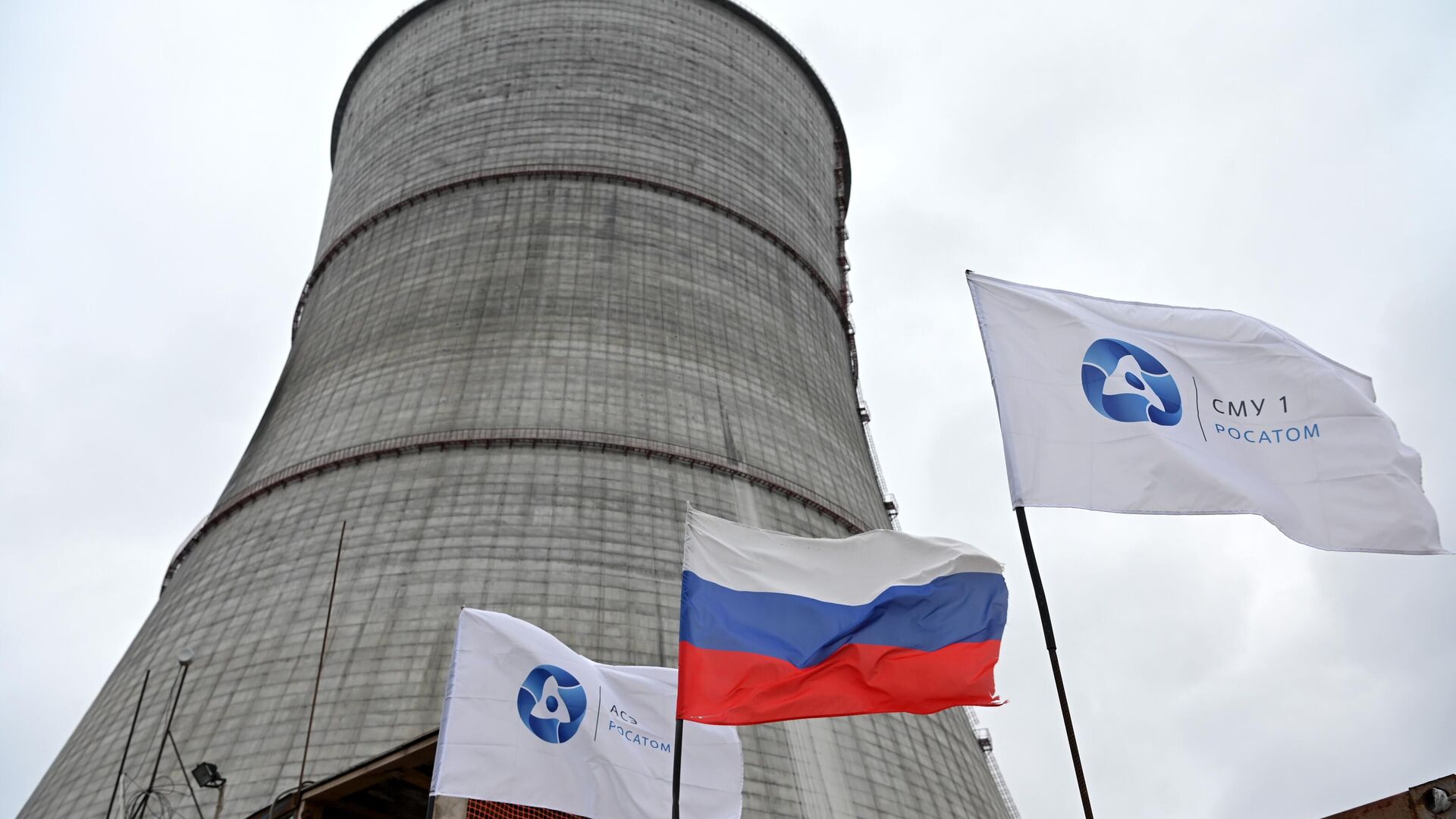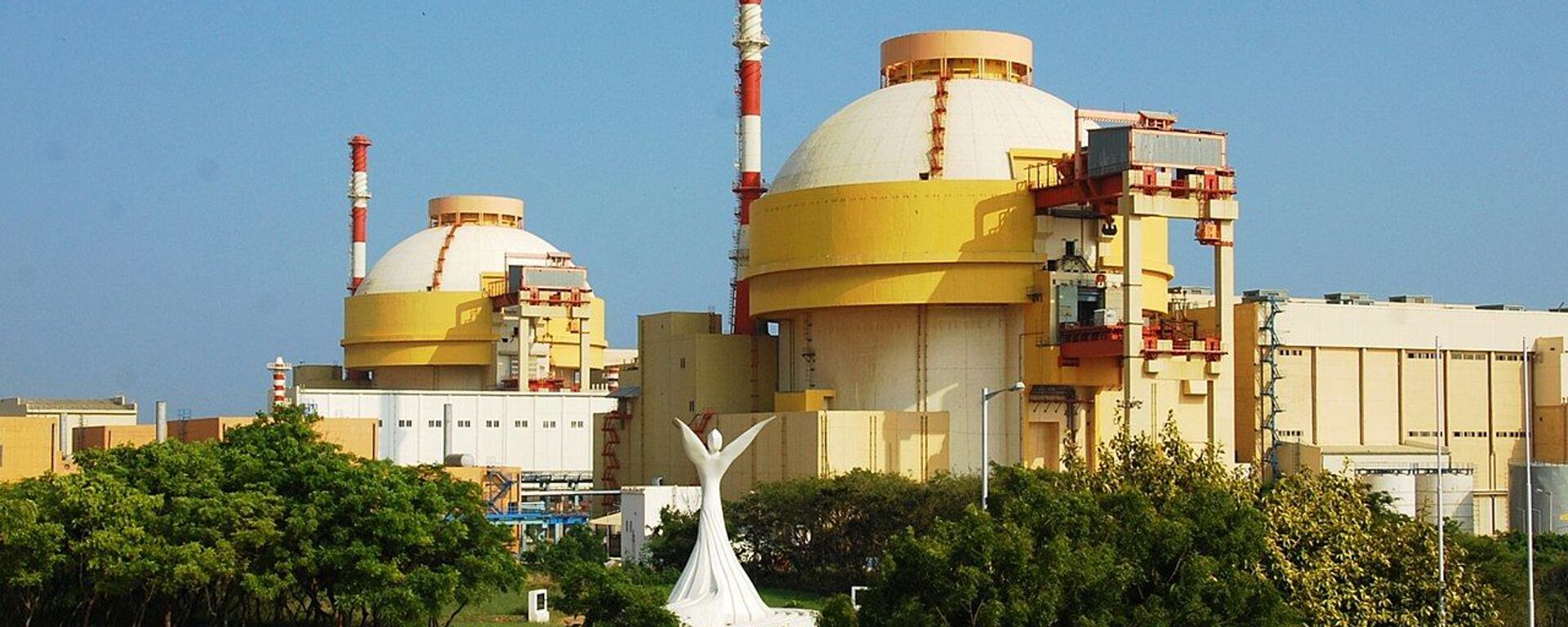https://sputniknews.in/20240312/india-russia-in-talks-on-thermonuclear-research-transit-potential-of-north-sea-6809487.html
India, Russia in Talks on Thermonuclear Research, Transit Potential of North Sea
India, Russia in Talks on Thermonuclear Research, Transit Potential of North Sea
Sputnik India
Russia's Rosatom, which specializes in nuclear energy and other high-tech products, has been collaborating with India to enhance its non-fossil fuel energy to approximately 50% by 2030 and attain carbon neutrality by 2050.
2024-03-12T16:23+0530
2024-03-12T16:23+0530
2024-03-12T16:23+0530
indo-russian relations
india
russia
moscow
rosatom
https://cdn1.img.sputniknews.in/img/07e7/07/1f/3295822_0:140:3143:1908_1920x0_80_0_0_8f3ddc60e0eff7ecf0b7ed00798789d9.jpg
India and Russia are currently in talks to join forces in various areas, such as researching controlled thermonuclear fusion and collaborating on the development of the transit potential of the Northern Sea Route, a top official of the state-run atomic energy corporation in Moscow, Rosatom, has said.A. E. Likhachev, CEO of Rosatom, told the Indian news agency that the joint development of transit potential of the Northern Sea Route, which is operated by Rosatom, will help ensure supplies of Russian oil, coal and liquefied natural gas to India via the said route, with transshipment in Russian Far Eastern ports.While visiting the Kudankulam Nuclear Power Plant (KNPP) in India's Tamil Nadu last month, Likhachev said that Rosatom are looking for prospects for further cooperation with India in the field of nuclear technologies and in non-energy and non-nuclear areas.He added that both India and Russia have gained enormous experience in cooperation during the construction of KNPP's first units.Moreover, Rosatom is actively advancing a wide range of new ventures, totaling approximately 80, and eagerly offering to collaborate with friendly nations to share its groundbreaking advancements."Thus, we can offer the Indian side our competencies in the construction of low-power nuclear power plants," he added.Likachev said Rosatom was also ready to provide Indian scientists, the opportunity to conduct research at the most powerful research reactor in the world 'MBIR multi-purpose fast neutron research reactor' which is currently under construction in Russia.Rosatom is planning to significantly increase its cumulative installed capacity share of non-fossil fuel energy sources to around 50 per cent by 2030 and achieve net-zero emissions by 2050 as part of India's long-term energy strategy and goals which will be attained with the help of nuclear energy.
https://sputniknews.in/20240128/russias-rosatom-announces-npp-launches-in-india--bangladesh-scheduled-for-2024-6362710.html
india
russia
moscow
Sputnik India
feedback.hindi@sputniknews.com
+74956456601
MIA „Rossiya Segodnya“
2024
Sangeeta Yadav
https://cdn1.img.sputniknews.in/img/07e6/0c/0f/110602_0:0:641:640_100x100_80_0_0_c298016a79eb02ef8caa9d1f688c12a5.jpg
Sangeeta Yadav
https://cdn1.img.sputniknews.in/img/07e6/0c/0f/110602_0:0:641:640_100x100_80_0_0_c298016a79eb02ef8caa9d1f688c12a5.jpg
News
en_IN
Sputnik India
feedback.hindi@sputniknews.com
+74956456601
MIA „Rossiya Segodnya“
Sputnik India
feedback.hindi@sputniknews.com
+74956456601
MIA „Rossiya Segodnya“
Sangeeta Yadav
https://cdn1.img.sputniknews.in/img/07e6/0c/0f/110602_0:0:641:640_100x100_80_0_0_c298016a79eb02ef8caa9d1f688c12a5.jpg
thermonuclear research, transit potential of north sea, russia's rosatom, nuclear energy, high-tech products, non-fossil fuel energy, carbon neutrality, thermonuclear fusion, atomic energy corporation in moscow, rosatom, ae likhacheva, ceo of rosatom, supplies of russian oil, coal, liquefied natural gas to india, russian far eastern ports, euro-asian container transit project, kudankulam nuclear power plant (knpp), nuclear technologies, non-energy, non-nuclear areas, knpp's first units, first nuclear power plant in bangladesh, rooppur npp, research reactor in the world, mbir multi-purpose fast neutron research reactor, net-zero emissions, india's long-term energy strategy and goals,
thermonuclear research, transit potential of north sea, russia's rosatom, nuclear energy, high-tech products, non-fossil fuel energy, carbon neutrality, thermonuclear fusion, atomic energy corporation in moscow, rosatom, ae likhacheva, ceo of rosatom, supplies of russian oil, coal, liquefied natural gas to india, russian far eastern ports, euro-asian container transit project, kudankulam nuclear power plant (knpp), nuclear technologies, non-energy, non-nuclear areas, knpp's first units, first nuclear power plant in bangladesh, rooppur npp, research reactor in the world, mbir multi-purpose fast neutron research reactor, net-zero emissions, india's long-term energy strategy and goals,
India, Russia in Talks on Thermonuclear Research, Transit Potential of North Sea
Russia's Rosatom, which specializes in nuclear energy and other high-tech products, has been actively collaborating with India to enhance its non-fossil fuel energy to approximately 50 percent by 2030 and attain complete carbon neutrality by 2050.
India and Russia are currently in talks to join forces in various areas, such as researching controlled thermonuclear fusion and collaborating on the development of the transit potential of the Northern Sea Route, a top official of the state-run atomic energy corporation in Moscow, Rosatom, has said.
A. E. Likhachev, CEO of Rosatom, told the Indian news agency that the joint development of transit potential of the Northern Sea Route, which is operated by Rosatom, will help ensure supplies of Russian oil, coal and liquefied natural gas to India via the said route, with transshipment in Russian Far Eastern ports.
"We are also exploring options for cooperation within the framework of the Euro-Asian Container Transit project. This project involves the organization of a pilot line for international container transit through the Northern Sea Route," Likhacheva said.
While visiting the Kudankulam Nuclear Power Plant (KNPP) in India's
Tamil Nadu last month, Likhachev said that Rosatom are looking for prospects for further cooperation with India in the field of
nuclear technologies and in non-energy and non-nuclear areas.
He added that both India and Russia have gained enormous experience in cooperation during the construction of KNPP's first units.
"Already, our cooperation extends beyond the borders of India. Indian companies are participating in Rosatom's project to build the first nuclear power plant in Bangladesh – Rooppur NPP," he told Indian news agency.
Moreover, Rosatom is actively advancing a wide range of new ventures, totaling approximately 80, and eagerly offering to collaborate with friendly nations to share its groundbreaking advancements.
"Thus, we can offer the Indian side our competencies in the construction of low-power nuclear power plants," he added.
Likachev said Rosatom was also ready to provide Indian scientists, the opportunity to conduct research at the most powerful research reactor in the world 'MBIR multi-purpose fast neutron research reactor' which is currently under construction in Russia.
"It will open up unique opportunities for conducting a wide range of work on medical topics, research in the field of fundamental and applied physics, as well as in the interests of creating new materials," he said.
Rosatom is planning to significantly increase its cumulative installed capacity share of non-fossil fuel energy sources to around 50 per cent by 2030 and achieve net-zero emissions by 2050 as part of India's long-term energy strategy and goals which will be attained with the help of nuclear energy.



